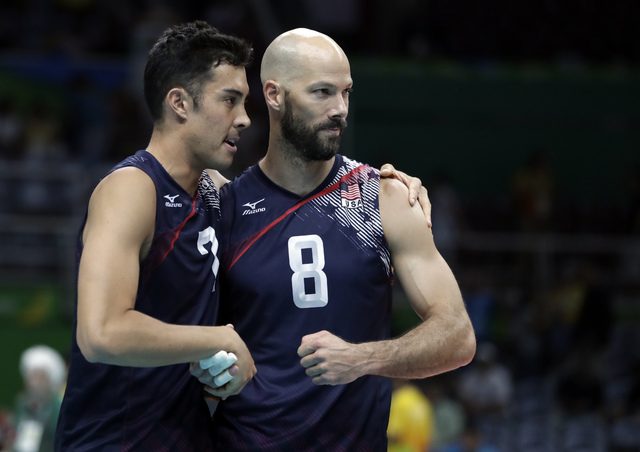RIO DE JANEIRO — Taylor Sander leapt high for timely blocks. He went low for a save at floor level to keep a winning point going. Then, he squatted way down to send another tough ball back over the net.
RIO DE JANEIRO — Taylor Sander leapt high for timely blocks. He went low for a save at floor level to keep a winning point going. Then, he squatted way down to send another tough ball back over the net.
At last, the U.S. men’s volleyball team is playing the very brand of volleyball the Americans knew they had in them to make a special run at the Olympics. It just took a few days longer than expected to get going and find a winning groove.
They reached the quarterfinals Monday after that slow start, victors in their third straight match to conclude pool play by dominating Mexico 25-23, 25-11, 25-19. Canada, playing in its first Olympics since 1992 in Barcelona, also advanced after beating Italy in four sets for its first victory against the first-place pool A winner in major competition and hand the Italians their first loss in Rio. Laster, Brazil beat France in four sets.
Sander’s kill from the left side on match point sealed it for the U.S. He is one of several among the team’s eight first-time Olympians to make vast improvements the past three matches.
“We all had to pick it up,” Sander said. “Those first two matches, we weren’t playing USA Volleyball. We weren’t aggressive, we weren’t giving our heart every single point. Our coaching staff did a good job holding us accountable. We had a couple team meetings. We all just sat and talked about what we needed to do to win. We talked about it, then we went and did it.”
The 24-year-old Sander, who had struggled with an aggressive but inconsistent serve in the initial two contests, was stellar defensively for the fifth-ranked Americans. He also has been growing a mustache for the Olympics — not so much out of superstition but because his teammates won’t allow him or Kawika Shoji to shave the way things have turned around in Rio de Janeiro.
“We’re going red polos and mustaches apparently,” U.S. coach John Speraw joked of the facial hair and coaches’ red shirts worn on match day.
Sander took it upon himself to find ways to relax away from Maracanazinho arena. He has been swimming with teammates at the Navy School where the Americans train or watching other sports on TV to keep from feeling any added pressure.
“Him articulating that is really nice to see that he has that kind of awareness about where he was and what he needed to do in order to improve,” Speraw said. “He’s learning the challenges of the mental game when put under great duress and he’s never experienced this before. For him to have experienced that, recognized it, learned what he needed to do in order to perform better and then come out and execute is a wonderful long-term lesson.”
What a dramatic turnaround in a week’s time for Sander and the young Americans, greeted by chants of “U-S-A!” when they entered for pregame warmups to face eliminated Mexico (0-5).
After losses to Canada and Italy to begin the tournament, the U.S. stunned host Brazil in four sets then topped France in another four-setter Saturday.
Reid Priddy, in his fourth Olympics, is relishing watching how far the kids have come in Rio.
“The enormity of the Olympic Games requires a 24-hour learning curve. We’ve been able to respond after those first two matches,” the 38-year-old Priddy said. “In fact, I think it put us right in the mentality of where we need to be. …
“We’re almost more prepared now to face this quarterfinal match than we would have been had we swept 5-0.”



